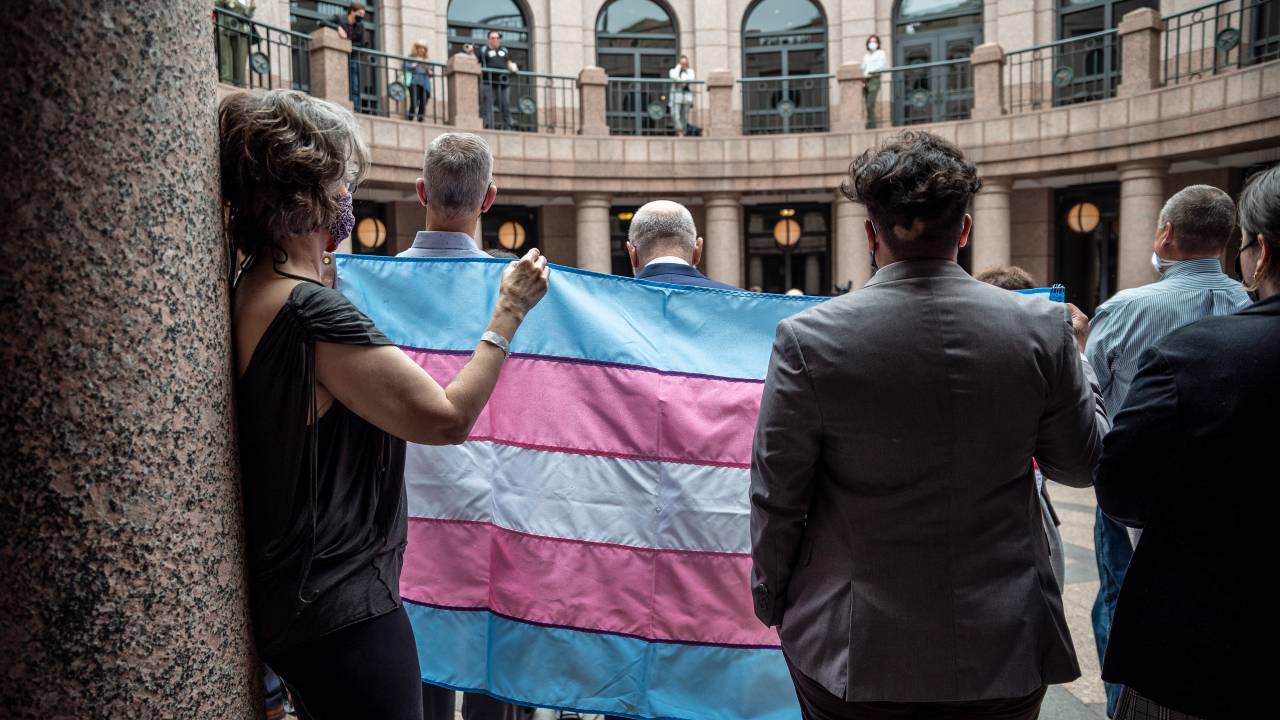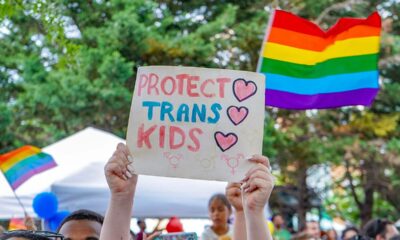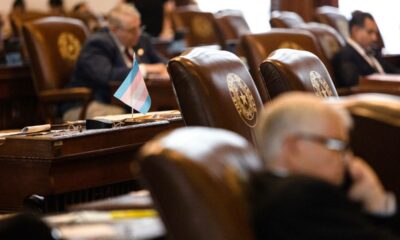88th Texas Legislature
Transgender Texans and doctors say Republican lawmakers misconstrue what science says about puberty blockers and hormone therapy
In 2021, a bill that would block transgender kids’ access to transition-related care passed the Senate but died in the Texas House. This year, a majority of House members back such a ban.

This article originally appeared in The Texas Tribune
 Several Republican Texas lawmakers are clashing with medical groups over whether puberty blockers and hormone therapies help or hurt transgender kids. Those conflicting positions come as some legislators push bills that would limit — or completely block — queer youth from accessing transition-related treatments that many medical associations support.
Several Republican Texas lawmakers are clashing with medical groups over whether puberty blockers and hormone therapies help or hurt transgender kids. Those conflicting positions come as some legislators push bills that would limit — or completely block — queer youth from accessing transition-related treatments that many medical associations support.
Sen. Donna Campbell, R-New Braunfels, is championing a bill that would bar doctors from providing such treatments — but only if they’re used to help a child gender transition. During a debate last week on her Senate Bill 14, Campbell and opponents of transition-related care portrayed doctors who provide such care as opportunists capitalizing on a “social contagion” with treatments that lack sufficient scientific data that could determine whether the care is safe and effective.
“I got into the Senate, or government, because I wanted government out of our lives,” Campbell said during the Senate State Affairs Committee hearing. “But if there comes a time when a profession, such as the medical profession, cannot regulate itself to protect patients, protect children, then the government needs to step in.”
Yet medical groups, doctors and transgender Texans say the scores of lawmakers backing such bans are either missing the point of how transition-related health care helps trans people — or are deliberately misconstruing information to target an already marginalized group of people.
They say puberty blockers and hormone therapies — transitition-related surgery involving sex organs is almost never performed on children — are aimed at improving the mental health of trans kids, who are far more likely to be depressed and attempt suicide than their cisgender peers. A 2015 report by the National Center for Transgender Equality found 40% of the roughly 27,000 transgender people surveyed had attempted suicide — almost nine times the average rate in the country.
Dr. Jessica Zwiener, an endocrinologist who works with trans youth and adults in Houston, told lawmakers in both her testimonies against SB 14 and the identical House Bill 1686 that her patients’ mental health dramatically improves once they start taking hormones — such as when trans girls take estrogen and trans boys take testosterone.
“They become more outgoing, they take better care of themselves, they try harder in school. They’re just happier; they can see a future,” Zwiener testified on SB 14. “Nobody talks about that.”
In 2021, the Senate passed a bill similar to SB 14, but that measure died in the Texas House. This year, though, a majority of House members have also signed on as authors or co-authors to HB 1686.
Spanning several hours on Monday, the House Public Health Committee’s discussion on HB 1686 is touching on similar debates as those of SB 14 regarding the science and research behind transition-related care for trans youth, including puberty blockers, hormone therapies and surgeries. The committee has also seen more pushback against social transitioning and psychiatric care for trans youth, particularly from Republican State Rep. Tony Tinderholt of Arlington.
“Would you agree with me that trying to psychologically transition these children is harmful to them, along with what the bill already covers?” Tinderholt asked.
State Rep. Tom Oliverson, the Cypress Republican who filed HB 1686, responded that they are “not neutral acts” — but noted that their “effects are a little less well understood than the effects of the medicines.”
Tinderholt also repeatedly asked medical providers to define woman — and whether they would “push” their patients and families to go to another state to access transition-related care, if the legislation passes.
On the other hand, the three openly gay Democrats sitting on the House committee — state Reps. Ann Johnson of Houston, Jolanda Jones of Houston and Venton C. Jones of Dallas — brought more lines of questioning for lawmakers and witnesses backing the bill. They also invoked their own personal stories to fight HB 1686.
“You may not remember the moment you found out you were straight. I remember the moment I knew I was gay and it’s because society told me there was something wrong about me,” Johnson said, pushing back against the argument that there’s an overwhelming reliance on youths’ self-perception in providing care. “I hope that this state will find a way to make decisions that [are] compassionate and protecting of all Texas children.”
At about 9 p.m. Monday, Johnson announced that under 100 people have registered in support of HB 1686, while over 2,700 are against the legislation. Of these figures, 470 people signed up to testify — though the committee had only heard from just over a dozen people by that point. A few hours earlier, hundreds of LGBTQ Texans and advocacy groups filled all three levels of the Capitol’s outdoor rotunda to rally against the legislation and the numerous other bills that target this community.
Meanwhile, SB 14 has moved quickly this legislative session. Hundreds of people debated the bill for hours on March 16. Senate Affairs Committee members voted 8-3 along party lines March 20 to advance it to the full Senate. Lt. Gov. Dan Patrick made the matter a priority for the Senate this year. The full chamber could vote on SB 14 this week.
The issue is fraught with vehement political division. SB 14 and similar bills are among a bevy of legislation Republican lawmakers are pushing that could upend the lives of LGBTQ Texans. During this month’s hearing on SB 14, GOP activist Steven Hotze went on an anti-trans tirade, calling doctors who provide this type of health care pedophiles. Sen. José Menéndez, D-San Antonio, asked Hotze not to lob baseless and incendiary attacks. Menéndez said trans people are “living their true selves.”
“That’s bullshit,” Hotze replied before he was kicked out of the hearing.
Care aimed at mental health
Transition-related care works to address mental health issues associated with gender dysphoria — the distress someone experiences when their gender identity doesn’t match the sex assigned at birth. Not all transgender people experience gender dysphoria, though depression and suicidal ideation are often worsened by the discrimination and stigma transgender people face.
Parents are involved in making decisions about the practices and treatments that make the most sense for transgender children. Doctors overwhelmingly follow a care timeline recommended by major medical associations. Many recommend waiting until a trans child can give informed consent, usually around age 16, before beginning hormone therapy. Medical providers are dissuaded from pushing young people to identify as transgender, socially transition or begin medical treatments.
Campbell said transition-related care does not help children overcome depression or anxiety related to gender dysphoria, even though several studies have demonstrated decreases in depression or anxiety symptoms for transgender youth receiving medical care that facilitates transitioning.
A study funded by the National Institute of Health and published in January — which followed over 300 young trans people for two years while they were receiving hormone therapies — found decreased symptoms of depression and anxiety and improvements in life satisfaction. There’s an abundance of research indicating transition-related care improves the mental health and well-being of transgender youth and adults. A recent survey conducted by the Washington Post and the Kaiser Family Foundation found 78% of the transgender respondents said living as the gender with which they identify has made them more satisfied with their lives.
Campbell did not return multiple requests for comment, but her statements in last Thursday’s hearing and her written support of SB 14 contained multiple claims that contrasted with guidance released by major medical associations and peer-reviewed research.
Campbell is a doctor herself. She received a medical degree from Texas Tech University. Campbell completed her residency in ophthalmology, a surgical specialty in eye disorders. She is also a board-certified emergency medicine physician, according to her campaign website.
Critics of puberty blockers and hormone therapies, including Campbell, say there isn’t sufficient data to indicate these treatments address gender dysphoria.
Megan Mooney, a licensed psychologist in Houston who represented the Texas Psychological Association in testifying against SB 14, said the science is clear about the mental health benefits of medical interventions, including puberty blockers and hormone treatments, for transgender youth.
Mooney also said there is data about the potential harms of delaying treatment, which shows that patients who receive transition-related care at later ages are at increased risk of suicidal attempts and self-harm.
“I urge you to consider what science tells us consistently: Gender-affirming medical care is the recommended, evidence-based approach to treat gender dysphoria in youth,” Mooney said in this month’s hearing. “This legislation will harm children as opposed to helping them.”
Zwiener acknowledged there aren’t large-scale studies stretching back decades about the long-term effects of puberty blockers and hormone therapy on transgender youth. She said that’s because, until recently, this care was relatively uncommon. She also said research institutions have not historically been interested in this area of study, given the stigma and lack of funding.
“The solution to ‘lack of data’ is more studies, not banning care — especially when the smaller studies and anecdotal evidence are overwhelmingly positive,” Zwiener said.
“A huge shift”
In this month’s Senate State Affairs Committee hearing, Campbell said puberty blockers, hormone therapy and surgery are permanent treatments. Puberty blockers are reversible after a person stops using them, and hormone therapies are partially reversible, major medical associations say. Minors can sometimes undergo surgeries on their breasts and chests — but only around ages 16 or 17, and only in specific circumstances after doctors weigh a patient’s situation with family support. Kids rarely, if ever, receive what’s called “bottom surgery,” or procedures involving their genitals.
Campbell claimed that most children will grow out of gender dysphoria with appropriate counseling. Opponents of transition-related care in Texas have pointed to studies that claimed roughly 80% of children with gender dysphoria eventually “detransition.” Working groups have found deficiencies in research supporting that statistic, including insufficient study sizes and unreliable sampling techniques.
A recent study published by the American Academy of Pediatrics followed over 300 trans youth over five years after social transitioning and found less than 3% of those children detransitioned.
“A lot of it just kind of comes down to the whole alternative facts thing, like what is true and what is not true,” Zwiener said.
Critics of transition-related care have called transgender identity a “social contagion.” Campbell and others have also suggested the significant increases in the number of children seeking transition-related care should raise suspicions.
“This leaves room to speculate a potential profit motive for those who perform these purely elective and very expensive procedures,” the Senate Research Center’s analysis of Campbell’s bill says.
Doctors who treat transgender patients say the growing visibility and social acceptance of trans people is driving the increasing numbers of youth identifying as transgender.
Zwiener said that adult patients in their 50s and 60s came to her after stumbling across the trans community online and realizing there were others who shared their same sense of identity.
Doctors who spoke with The Texas Tribune said medical providers closely follow guidelines established by the American Academy of Pediatrics, the World Professional Association for Transgender Health and the Endocrine Society when administering transition-related care.
Puberty blockers and hormone therapies, like many medical treatments, can have side effects. That includes bone mineralization and the potential for fertility loss. But doctors say the positive impact of transition-related care on mental health outweighs the risks of those side effects.
The families Zwiener works with are well aware of the side effects, even if the majority don’t have prior experiences with transgender people. But they’re following the medical guidance of professionals and the pleas of their children, Zwiener said, because parents want the best outcome for their kids.
“We’re talking about these [minor bone density issues] … when it’s just such a huge shift in these kids’ lives,” Zwiener said.
Walking a political tightrope
Campbell criticized Texas medical associations for supporting transition-related care, which she alleged harmed children. Those who oppose her SB 14 include the Texas Pediatric Society and the Texas Psychological Association.
The Texas Medical Association, though, has not taken a position. That group previously opposed similar legislation. But Dr. John Carlo, a member of the association’s board of trustees, said the group is remaining neutral in hopes that it can continue discussions with lawmakers and help shape the legislation.
TMA wants to ensure children already receiving transition-related treatments — approved by their medical team — continue receiving that care, Carlo said. This includes allowing any youth, including those from out of state, to continue taking hormone therapy or puberty blockers while hospitalized for an extended time in a Texas hospital, TMA President Gary Floyd said during the Monday hearing for HB 1686. The association also wants to make sure that doctors who provide the care don’t lose their licenses.
Carlo said TMA’s Council on Legislation is weighing each bill individually and making judgements that will best serve patients in Texas.
“We’re not essentially closing the door on any one argument, because I think at this point this is such a highly politicized topic,” Carlo said. “What we’re trying to do is maintain a basis of scientific evidence, look at it from the perspective of how we best take care of patients.”
Andrea Segovia, senior field and policy adviser for the Transgender Education Network of Texas, said people should be able to decide what’s best for their own health care with their doctors. The scope of transition-related care is different for every trans person, Segovia said, and is not a one-size-fits-all approach.
“This blanket approach that we see with this health care [ban], but also in general when talking about trans issues, affects people’s freedoms and liberties in the state of Texas, where we are the state that says freedom and liberty matters the most to us,” Segovia said.
Republican Texas lawmakers and officials — and far-right groups — have politicized several aspects of LGBTQ peoples’ lives in recent years. This legislative session, GOP lawmakers are also trying to severely restrict classroom lessons, school activities and teacher guidance about sexual orientation and gender identity. They are also pushing bills that would limit when kids can see drag shows and restrict the college sports teams that trans student athletes can join.
Earlier this year, the Tribune found that a small but influential cadre of activists and extremist groups have fueled anti-drag panic as they characterize all drag as inherently sexual. Those claims have then been used to justify legislation targeting the LGBTQ community as a whole, often under the guise of protecting kids.
After GOP lawmakers failed to ban puberty blockers and hormone treatments for trans kids in 2021, Republican Attorney General Ken Paxton issued a nonbinding legal opinion that equated transition-related care with child abuse. Gov. Greg Abbott then sent a letter to the Department of Family and Protective Services directing the agency to investigate parents who provided transition-related care to their transgender children. LGBTQ advocacy groups are fighting that directive, which a Travis County judge largely blocked last year. But Paxton earlier this month also asked that the injunction be lifted.
Zwiener said the threat of banning transition-related care has actually made doctors closely adhere to best practices and pay attention to their patients’ progress and outcomes — despite what opponents say about the field of care.
“People who support gender-affirming care are always very worried that it’s going to be taken away, or it’s going to be made illegal, and so people tend to do things very conservatively, very by the book,” she said.
Alex Nguyen and Maia Spoto contributed to this story.
Disclosure: The Texas Medical Association and Texas Tech University have been financial supporters of The Texas Tribune, a nonprofit, nonpartisan news organization that is funded in part by donations from members, foundations and corporate sponsors. Financial supporters play no role in the Tribune’s journalism. Find a complete list of them here.
The Texas Tribune is a nonpartisan, nonprofit media organization that informs Texans — and engages with them – about public policy, politics, government and statewide issues.
88th Texas Legislature
Texas’ ban on certain drag shows is unconstitutional, federal judge says
Senate Bill 12 would have prohibited performers from dancing suggestively or wearing certain prosthetics in front of children. Critics sued the state, saying it violated the First Amendment.

This article originally appeared in The Texas Tribune
 Texas cannot enforce a new law that restricts some public drag shows, a federal judge said Tuesday in declaring the legislation unconstitutional.
Texas cannot enforce a new law that restricts some public drag shows, a federal judge said Tuesday in declaring the legislation unconstitutional.
U.S. District Judge David Hittner found Senate Bill 12 “impermissibly infringes on the First Amendment and chills free speech.” The struck-down law prohibited any performers from dancing suggestively or wearing certain prosthetics in front of children.
Hittner ruled that language discriminated based on viewpoint and is unconstitutionally overbroad and vague.
“The Court sees no way to read the provisions of SB 12 without concluding that a large amount of constitutionally-protected conduct can and will be wrapped up in the enforcement of SB 12,” the ruling reads. “It is not unreasonable to read SB 12 and conclude that activities such as cheerleading, dancing, live theater, and other common public occurrences could possibly become a civil or criminal violation.”
The plaintiffs who sued the state celebrated the order, saying in statements shared by their lawyers that the decision affirmed their rights to express themselves.
“I am relieved and grateful for the court’s ruling,” drag performer Brigitte Bandit said. “My livelihood and community has seen enough hatred and harm from our elected officials. This decision is a much needed reminder that queer Texans belong and we deserve to be heard by our lawmakers.”
Republican state Sen. Bryan Hughes, who authored SB 12, defended the bill and pledged to challenge the ruling. The Texas Attorney General’s Office will appeal the ruling, a spokesperson said.
“Surely we can agree that children should be protected from sexually explicit performances. That’s what Senate Bill 12 is about,” Hughes said. “This is a common sense and completely constitutional law, and we look forward to defending it all the way to the Supreme Court if that’s what it takes.”
Critics of the bill, though, say that Republican lawmakers and officials this year have incorrectly — and unfairly — portrayed all drag performances as inherently sexual or obscene.
While SB 12 was originally billed as legislation that would prevent children from seeing drag shows, the final version did not directly reference people dressing as the opposite gender.
However, Republican leaders, including Gov. Greg Abbott, made it clear that drag shows were the bill’s target — comments and history that Hittner wrote “the court cannot ignore.”
Last month, Hittner temporarily blocked SB 12 from taking effect on Sept. 1 after a two-day hearing for a lawsuit filed against the state by a drag queen and LGBTQ+ groups.
LGBTQ+ Texans, advocates, artists and business groups who sued the state, argued that the law discriminates against the content of performances and restricts equally protected free expression that is protected under the First and 14th Amendments.
In Tuesday’s 56-page ruling, Hittner noted a survey of court decisions “reveals little divergence from the opinion that drag performances are expressive content that is afforded First Amendment protection.”
“Drag shows express a litany of emotions and purposes, from humor and pure entertainment to social commentary on gender roles,” the ruling reads. “There is no doubt that at the bare minimum these performances are meant to be a form of art that is meant to entertain, alone this would warrant some level of First Amendment protection.”
Other states have passed similar legislation restricting drag performance, which have also been struck down by federal courts.
In June, a federal judge in Tennessee, appointed by former President Donald Trump, ruled a law there was unconstitutional in its effort to suppress First Amendment-protected speech.
Bucking that trend, another Texas federal judge last week issued an opinion that supported drag show restrictions.
U.S. District Judge Matthew Kacsmaryk said that West Texas A&M University President Walter Wendler acted within his authority when he canceled a campus drag show. Kacsmaryk wrote that Free Speech jurisprudence had “not clearly established that all ‘drag shows’ are categorically ‘expressive conduct.’”
Hittner acknowledged his Panhandle counterpart’s ruling Tuesday. Hittner pointed to a letter in which Wendler explained his reasoning for banning the show, comparing drag to blackface and a slapstick sideshow.
“The president’s sentiment reinforces this Court’s opinion that while some people may find a performance offensive or morally objectionable, it does not mean the performance is not expressive or given First Amendment protection,” he wrote. “Not all people will like or condone certain performances. This is no different than a person’s opinion on certain comedy or genres of music, but that alone does not strip First Amendment protection.”
LGBTQ+ advocates welcomed Hittner’s decision Tuesday.
“Today’s ruling is a celebration for the LGBTQ community and those who support free expression in the Lone Star State,” GLAAD President and Chief Executive Officer Sarah Kate Ellis. “Texas now joins an increasing number of states whose discriminatory and baseless bans on drag performances are being recognized as unconstitutional and an attack against everyone’s freedoms.”
William Melhado contributed to this story.
The Texas Tribune is a nonpartisan, nonprofit media organization that informs Texans — and engages with them – about public policy, politics, government and statewide issues.
88th Texas Legislature
Federal judge bars Texas from enforcing book rating law
House Bill 900 requires book vendors to rate all their materials based on their depictions or references to sex before selling them to schools. Vendors say the law aims to regulate protected speech with “vague and over broad” terms.

This article originally appeared in The Texas Tribune
 A federal judge said Thursday he will stop a new Texas law aimed at keeping sexually explicit materials off of school library shelves on the eve of the law going into effect, according to state attorneys and lawyers for a group who sued over the proposal.
A federal judge said Thursday he will stop a new Texas law aimed at keeping sexually explicit materials off of school library shelves on the eve of the law going into effect, according to state attorneys and lawyers for a group who sued over the proposal.
District Judge Alan D. Albright indicated during a hearing that he will grant a temporary injunction sought by a group of book groups and sellers, including two Texas bookstores, who sued the state over House Bill 900 in July, the group’s lawyers said in a statement. Albright will issue a written order in one to two weeks; in the meantime, the state cannot enforce the law, according to the statement.
HB 900, which was approved during this year’s regular legislative session, requires school library vendors to rate all their books and materials for appropriateness before selling them to schools based on the presence of sex depictions or references. It also requires vendors to rank materials previously sold to schools and issue a recall for those that are deemed sexually explicit and are in active use by a school.
The plaintiffs argue that the law violates their constitutional rights by targeting protected speech with its broad and vague language. The lawsuit further alleges HB 900 would force plaintiffs to comply with the government’s views, even if they do not agree with them, and that the law operates as prior restraint, which is government action that prohibits speech or other expression before the speech happens. The vendors say it is impossible for them to comply with the rating system because of the sheer volume of materials they would need to review.
The law also calls for creating state school library standards that prohibit sexually explicit materials, requiring parental consent for students to check out materials classified by vendors as “sexually relevant” and giving the Texas Education Agency authority to review a vendor’s rating. If the TEA disagrees with the vendor’s rating and gives it a different one, the vendor must use the agency’s rating. Vendors who do not will be added to a list of vendors that schools cannot buy library materials from.
During the bill’s legislative hearings, librarians and legal experts shared concerns and worries that its language would ensnare books that are not inappropriate and, to the contrary, may be titles important for students whose lived experiences may not be reflected in other literature.
The proposal, from Rep. Jared Patterson, R-Frisco, arrived amid an ongoing debate about what materials are appropriate to be stocked in school and public libraries. Patterson and supporters of such regulations say libraries are infested with inappropriate books that must be vetted and removed.
However, skeptics of that panic and literary advocates counter that the books singled out by politicians often explore sexuality and race, topics that have been swept up in culture-war politics but remain important for youth who may not be comfortable talking about such matters with others.
Despite the concerns, HB 900 sailed through the legislative process before Gov. Greg Abbott signed it in June. It was set to go into effect Friday; however, the law’s language suggests the new requirements won’t have to be fulfilled immediately.
Most, if not all, of the state’s roughly 5.4 million public schoolchildren have already begun the 2023-2024 school year.
The lawsuit’s plaintiffs include two bookstores, Austin’s BookPeople and West Houston’s Blue Willow Bookshop, as well as the American Booksellers Association, the Association of American Publishers, the Authors Guild and the Comic Book Legal Defense Fund.
The Texas Attorney General’s office said Thursday it would move to reverse the injunction and appeal the judge’s decision. The office had not received the judge’s written order or decision by Thursday afternoon, a spokesperson said.
A court representative for Albright did not respond to an inquiry about his comments during Thursday’s hearing, reported by the plaintiffs’ lawyers and on social media by at least one plaintiff.
“We are grateful for the court’s swift action in deciding to enjoin this law, in the process preserving the long-established rights of local communities to set their own standards; protecting the constitutionally protected speech of authors, booksellers, publishers and readers; preventing the state government from unlawfully compelling speech on the part of private citizens; and shielding Texas businesses from the imposition of impossibly onerous conditions,” the plaintiffs said in a joint statement after the hearing. “We look forward to reading the court’s full opinion once it is issued.”
The Texas Tribune is a nonpartisan, nonprofit media organization that informs Texans — and engages with them – about public policy, politics, government and statewide issues.
88th Texas Legislature
Federal judge issues temporary restraining order, says Texas law banning drag shows is “likely” unconstitutional
U.S. District Judge David Hittner heard from LGBTQ+ groups, businesses and a drag performer in a hearing this week, who argued Senate Bill 12 violated their First Amendment rights.

This article originally appeared in The Texas Tribune
 U.S. District Judge David Hittner temporarily blocked a new state law Thursday from going into effect that would have criminalized sexually-oriented performances in front of children or effectively banned some public drag shows.
U.S. District Judge David Hittner temporarily blocked a new state law Thursday from going into effect that would have criminalized sexually-oriented performances in front of children or effectively banned some public drag shows.
LGBTQ+ groups sued the Texas attorney general’s office, hoping to stop authorities from enforcing Senate Bill 12, which was signed by Gov. Greg Abbott in June and was scheduled like most new laws to go into effect Friday.
In a two-day hearing earlier this week in Houston, a drag performer and entertainment businesses said Texas lawmakers’ effort to regulate these shows was an unconstitutional attempt to stifle their freedom of expression. Though Hittner did not issue a final order on Thursday, he found the plaintiffs’ argument compelling.
“Based on evidence and testimony presented at the hearing, the court finds there is substantial likelihood that SB 12 as drafted violated the First Amendment of the United States Constitution under one or more of the legal theories put forward by the plaintiffs,” Hittner wrote in the temporary restraining order.
Hittner said allowing the law to take effect would likely cause “irreparable harm” to the plaintiffs. He issued the restraining order to maintain the status quo of the legal landscape while preparing a final decision — the restraining order does not guarantee a permanent injunction. He said his order could come two to four weeks after the hearing.
Hittner heard testimony earlier this week from LGBTQ+ groups, businesses and a performer, which were plaintiffs in one of two lawsuits against SB 12. They argued the law trampled on their First Amendment rights to perform and organize drag shows. They described drag as a healing, expressive and political form of performance art with historical connections to LGBTQ+ people.
“If allowed to take effect, SB 12 will make our state less free, less fair, and less welcoming for every artist and performer,” said American Civil Liberties Union of Texas Attorney Brian Klosterboer in a statement following the judge’s decision. “This temporary order is a much-needed reprieve for all Texans, especially our LGBTQIA+ and transgender community, who have been relentlessly targeted by our state legislature.”
Defending the law, attorneys with the Texas attorney general’s office said SB 12 was narrowly tailored to protect children from sexually-explicit performances. The new law did not explicitly ban drag shows, lawyers for the state said, and these performances should not be considered expressive or receive First Amendment protections.
However, shortly after signing the law, Abbott shared a story on social media about SB 12’s passage and declared he had banned drag performances in public.
“The people of Texas were appalled to learn of an increasing trend of obscene, sexually explicit so-called ‘drag’ performances being marketed to families with children,” said Paige Willey, the director of communications for the attorney general’s office. “The Office of the Attorney General will pursue all legal remedies possible to aggressively defend SB 12, the state law that regulates such performances to protect children and uphold public decency.”
Under the new law, business owners would have had to face a $10,000 fine for hosting sexually explicit performances in which someone is nude or appeals to the “prurient interest in sex.” Performers caught violating the proposed restriction could be slapped with a Class A misdemeanor, which carries a maximum penalty of a year in jail and a $4,000 fine.
Texas is one of six states that have passed a bill restricting “adult” or drag performances, according to the Movement Advancement Project, a nonprofit that tracks legislation related to LGBTQ+ issues.
Legal challenges to similar legislation in Florida, Montana and Tennessee have successfully blocked these laws from going into effect. In June, a federal judge in Tennessee, appointed by former President Donald Trump, ruled the law is unconstitutional in its effort to suppress First Amendment-protected speech.
The Texas Tribune is a nonpartisan, nonprofit media organization that informs Texans — and engages with them – about public policy, politics, government and statewide issues.














